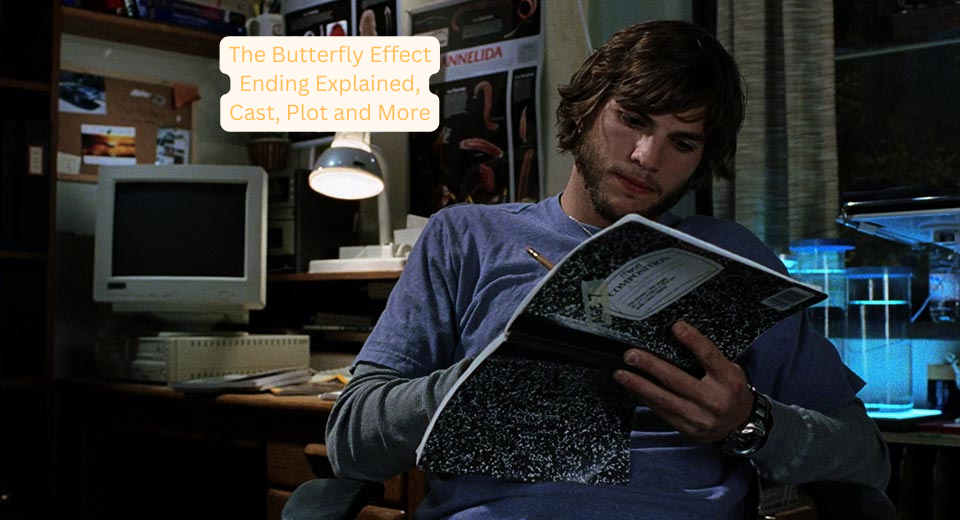The Butterfly Effect is a 2004 science fiction thriller film that explores the concept of chaos theory. It follows Evan Treborn (Ashton Kutcher), a man haunted by fragmented memories of his childhood that hold a dark secret. As Evan delves deeper into these memories, he discovers he possesses the ability to travel back in time and alter seemingly insignificant events. But here’s the catch: these changes have unforeseen and often devastating consequences, demonstrating the ripple effect of even the smallest actions.
A Cast of Damaged Souls: Who’s Who in The Butterfly Effect
- Evan Treborn (Ashton Kutcher): Our troubled protagonist, grappling with fragmented memories and a mysterious childhood trauma. Evan embarks on a journey of self-discovery and attempts to rewrite his past, but with unintended consequences.
- Kayleigh Miller (Amy Smart): Evan’s childhood friend and potential love interest. Kayleigh’s life takes a tragic turn, intertwined with Evan’s troubled past.
- Tommy Milligan (Ethan Suplee): Another childhood friend of Evan’s, burdened by a physical disability and a troubled home life. Tommy’s friendship with Evan becomes a catalyst for some of the life-altering events.
- Lenny (William Fichtner): A pedophilic neighbor who torments Evan and his friends. Lenny embodies the true darkness of Evan’s past and the core trauma he wants to erase.
A Web of Memories: Unravelling the Plot of The Butterfly Effect
The film unfolds in a non-linear fashion, mirroring Evan’s fragmented memories. As he revisits pivotal moments from his childhood, Evan can alter them through sheer willpower. Here’s a glimpse into the key events:
- Childhood Trauma: Evan witnesses and tries to prevent a series of horrific incidents involving his friends and the menacing neighbor, Lenny.
- Blackouts and Journaling: Evan experiences blackouts during times of emotional distress, and upon awakening, finds meticulous journals detailing past events, both real and altered.
- The Ripple Effect: Each time Evan changes the past, the present transforms dramatically, shaping the lives of those around him in unexpected ways. Some changes are positive, others tragically worse.
Warning: Potential Spoilers Ahead
The Butterfly Effect takes a dark turn as Evan realizes the devastating impact of his time travel exploits. Happy memories turn sour, relationships crumble, and tragedy seems inevitable. As he desperately tries to fix the present, Evan stumbles upon a horrifying realization: his very existence may be the root cause of the suffering he witnesses.
A Shocking Twist: The Butterfly Effect’s Unforgettable Ending (Spoiler Alert!)
The film offers multiple endings, each leaving a lasting impression:
- Theatrical Ending: In a bittersweet conclusion, Evan allows his childhood self to encounter Kayleigh, but chooses not to interact, suggesting he has accepted his inability to change the past without causing harm.
- Director’s Cut Ending: This darker version depicts Evan traveling back to before his birth and suffocating himself with his umbilical cord, essentially erasing himself from existence.
- Alternate Endings: Two additional endings offer a glimpse of a potential reconciliation between Evan and Kayleigh, leaving the future open to interpretation.
The ending you encounter will depend on the version you watch. However, the core message remains the same: the past is a delicate ecosystem, and tampering with it can have disastrous consequences.
Beyond the Mind-Bender: Thematic Depths of The Butterfly Effect
The Butterfly Effect goes beyond a sci-fi thriller. It explores profound themes:
- The Power and Peril of Choice: The film highlights the impact of our choices, both big and small, and the ripple effects they create in the lives of others.
- Coping with Trauma: Evan’s journey represents the struggle to confront and overcome childhood trauma. It’s a reminder that facing the past, however painful, is crucial for healing.
- Acceptance and Forgiveness: Ultimately, The Butterfly Effect underscores the importance of accepting the past and learning to forgive ourselves and others for past mistakes.
The film doesn’t offer easy answers, but it challenges viewers to contemplate the complex relationship between past, present, and future.
The Butterfly Effect: A Journey Through Time with Lasting Impact
The Butterfly Effect is a captivating film that combines mind-bending science fiction with a deeply personal story of redemption. It leaves a lasting impression, prompting us to reflect on the consequences of our actions and the power of acceptance.
Unveiling The Butterfly Effect’s Mysteries: FAQs
1. What are the different endings of The Butterfly Effect?
- Theatrical Ending: This is the most widely seen version. Evan allows his childhood self to encounter Kayleigh but doesn’t interact, suggesting acceptance of the past.
- Director’s Cut Ending: A bleaker take – Evan travels back to before his birth and essentially erases himself.
- Alternate Endings: Two additional endings offer a glimmer of hope, hinting at a potential reconciliation between Evan and Kayleigh.
The ending you see depends on the version you watch.
2. Does The Butterfly Effect accurately represent time travel?
The film’s portrayal of time travel is fictional. Chaos theory, which inspires the film’s concept, explores the unpredictable nature of complex systems, not literal time travel.
3. What is the significance of the butterfly metaphor in the film?
The butterfly represents the delicate balance of the past. Even a small change in the past (like a butterfly flapping its wings) can have significant and unforeseen consequences in the future.
4. Is The Butterfly Effect a sequel?
No, The Butterfly Effect is a standalone film. There was a sequel titled “The Butterfly Effect 2” released in 2002, but it’s a separate story with no connection to the original film.
5. What are some similar movies to The Butterfly Effect?
If you enjoyed The Butterfly Effect, here are some films that explore similar themes:
- Primer (2004): Another mind-bending sci-fi film about the consequences of time travel.
- Donnie Darko (2001): A psychological thriller with elements of time travel and a coming-of-age story.
- Memento (2000): A neo-noir thriller with a non-linear narrative that explores memory and perception.

